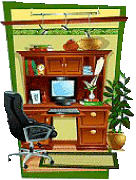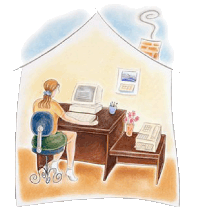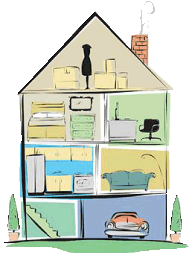CARL WATTS & ASSOCIATES
April 5, 2010

|
Washington DC
|
tel/fax 202 350-9002 |
Employee Business Expenses
Vs.
Home Office Expenses
Employee Business Expenses; Job-Related Expenses; Unreimbursed Employee Expenses; Office in the Home Expenses ... and Home Office Expenses ... let’s try to make more sense of all that.
|
If you have job related expenses that are not
reimbursed by your employee you can deduct them on your tax return:
 |
|||
|
|
Travel expenses (to and from business destinations, meals & lodging away from home, taxi fares, cleaning & laundry expenses)
|
||
|
|
Meals & entertainment (you can deduct up to 50% of expenses that are directly related to your business) |
||
|
|
Office supplies, business equipment and tools necessary to your profession |
||
|
|
Vehicle expenses like tolls, parking fees, oil (commuting to your main place of business is not deductible) | ||
|
|
Gifts for clients, associates, prospects, etc. | ||
|
Working from home (teleworking or tele-commuting) is becoming more and more popular, so you should know that some expenses are tax deductible.
To qualify you must have a certain space in your home dedicated as your principal place of work / business that you use regularly and exclusively for your employer’s convenience (that means your employer requires you to work at home, you don’t work at home simply because it is helpful and convenient for you).
For that area or percentage of your home dedicated to your office you can deduct the corresponding portion of: |
|||
|
|
Mortgage interest or rent |
||
|
|
Real estate taxes |
||
|
|
Utilities |
||
|
|
Repairs and maintenance |
||
|
|
Insurance |
||
|
|
Improvements |
||
|
|
Cost of home and land (depreciation costs) |
||
| And also: |
|||
|
|
Office supplies and equipment |
||
|
|
Moving expenses associated with taking a new job |
||
|
|
For these tax deductible expenses you must file: | ||
| Form 2106 and/or Form 2106-EZ and transfer total amounts on Schedule A. | |||
|
If you are self-employed operating a home business (or an independent contractor
operating from home) you have to file Form 8829 for your Home Office Expenses and then transfer the amounts to Schedule.
 |
|||
|
Every expense that you make in connection with your business can be tax deductible, the following included: |
|||
|
|
Transportation/vehicle (commuting) expenses to visit or meet your client |
||
|
|
Meals and entertainment for your clients |
||
|
|
Advertising | ||
|
|
Mail and postage expenses | ||
|
|
Mortgage percentage | ||
|
|
Utilities | ||
|
|
Cost of home and land | ||
|
|
Office equipment and office supplies | ||
|
|
Professional membership fees, subscriptions, etc | ||
|
|
Training and education | ||
|
|
Insurance | ||
|
There are two exceptions for which personal

use and business use of the home can be mixed:
|
|||
|
|
Operating a licensed day-care center in your home |
||
|
|
Using part of your home as storage for inventory or products to sell |
||
